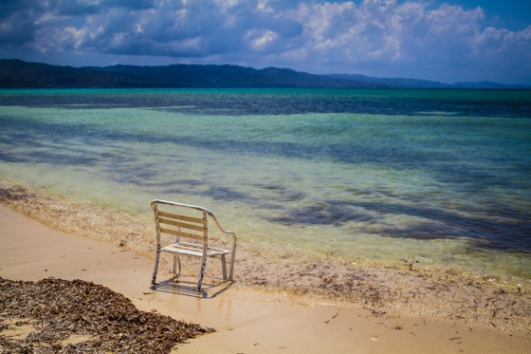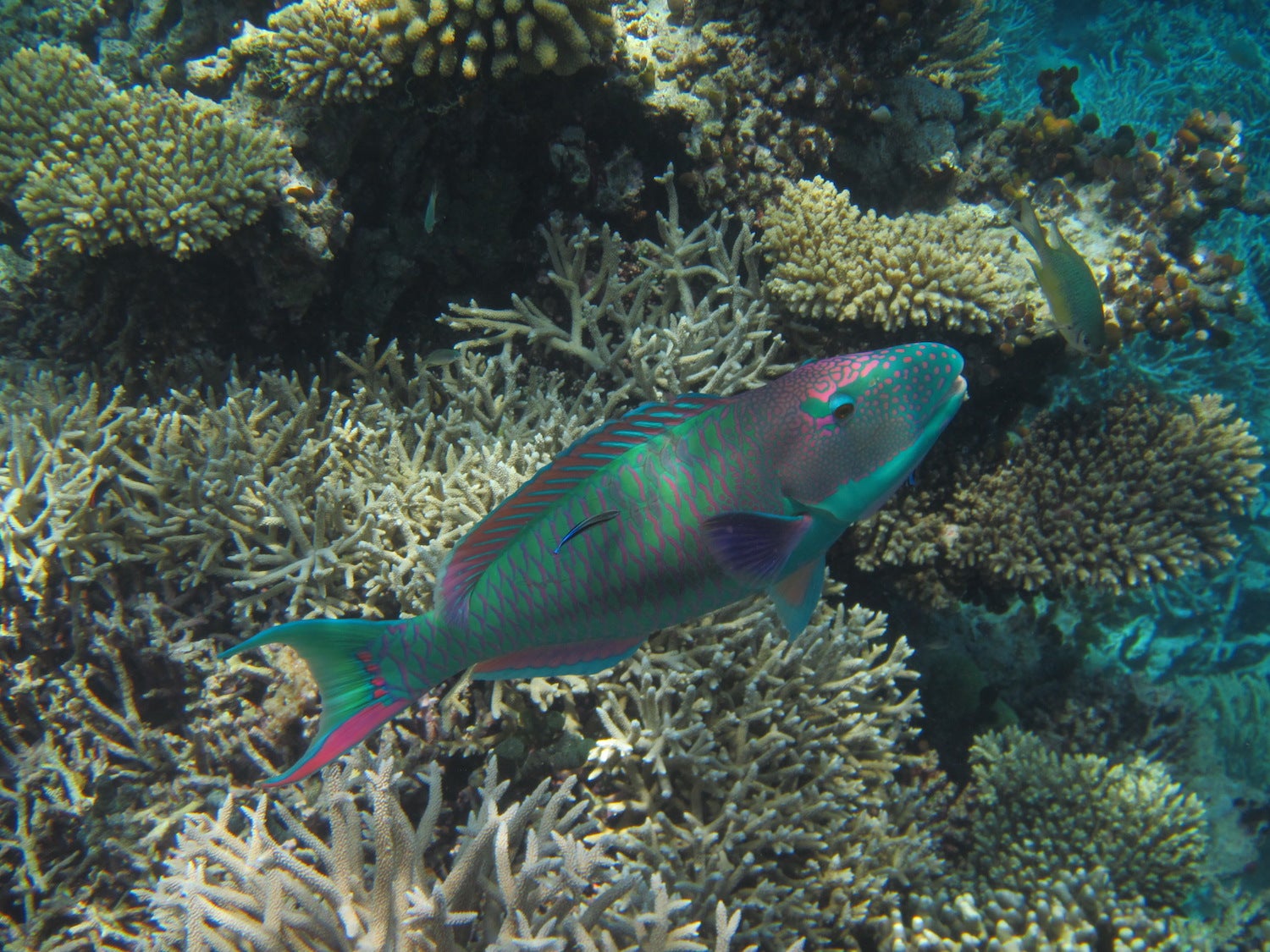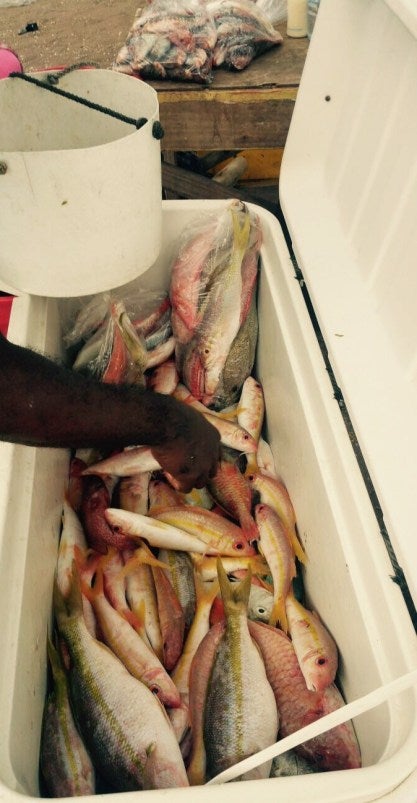Image source: Wikicommons
After living in Jamaica for five years, every time I visit for work, I try to squeeze in whatever time I have to say hello to friends.
On my last visit, I was very fortunate to have meetings on both sides of the weekend allowing me to spend my off days in a familiar place with familiar people. My friends and I decided to take advantage of this rare opportunity and head east to Hellshire, a popular Jamaican hang out spot along the coast, known for its fresh fish and other seafood done to order. To my great surprise, or rather disappointment, my friends all requested “parrotfish”, without remorse.
To many consumers, parrotfish is a saccharine delight, which in Jamaica is usually prepared whole and either fried, steamed or brown stewed. To ichthyologists, parrotfish are colorful and insatiable herbivores that spend around 90% of their day eating algae off of coral reefs. To environmentalists, parrotfish are sand machines, turning the coral they eat into … you guessed it: sand!
What I found was that my friends, who form part of the consumer group described above, did not intend to infuriate environmentalists. They simply did not understand the impact of their “delights” on the environment and the importance of preserving this species. This blog is what I tried to convey in my discussion with them.
Here are 3 reasons why we should immediately stop the consumption of parrotfish.
- The first one was already mentioned. Parrotfish “discharge” up to 100 kg of white sand a year for every year of their lives. Larger parrotfish are like sand factories, producing upwards of a tonne of sand per year. The University of Exeter found that parrotfish produced more than 85% of the new sand-grade sediment on the reefs in the Maldives. When we consider the impact over thousands of years, imagine the amount of beautiful white sand parrotfish can produce if they were allowed to live and not consumed. This is very important in avoiding beach erosion. Worms, sponges, and oysters also produce Pacific Ocean sand, but no animal is as proficient as the parrotfish. This also becomes irrelevant when we consider that Jamaica is not in the Pacific!
- Parrotfish are also essential to the survival of coral as they act as ‘natural cleaners’ of parasites that grow on it. Without the help of the parrotfish, the coral would simply die. According to a 2012 study, the loss of parrotfish disturbs the delicate balance of coral ecosystems and allows algae, on which they feed, to smother the reefs. The study also found that Caribbean corals have declined by more than 50 percent since the 1970s and may disappear in the next 20 years as a direct result of the loss of parrotfish and sea urchins — the area’s two main grazers — and not primarily as a result of climate change, as is widely believed. The study further shows that some of the healthiest Caribbean coral reefs are those in areas where governments “have restricted or banned fishing practices that harm parrotfish, such as fish traps and spearfishing”. These include the Flower Garden Banks National Marine Sanctuary in the northern Gulf of Mexico, Bermuda and Bonaire.
- Last but not least, let us consider the economy. A 2015 study noted that the direct contribution of travel and tourism to GDP in Jamaica was JMD128.3bn (8.1% of total GDP) in 2014, and was forecast to rise by 4.7% in 2015, and to rise by 4.6% pa, from 2015-2025 to JMD211.2bn (11.6% of total GDP) in 2025. Another study describes the importance of coral reefs to the people and economy of Jamaica. It shows what most of us already know: Coral reefs help to build and protect Jamaica’s beautiful white sand beaches, which attract tourists from around the world. Reefs provide critical habitat for Jamaica’s artisanal and industrial fisheries and also protect Jamaica’s coastline — including coastal communities and tourist hotels — from the destructive force of tropical storms. In other words, eating parrotfish has a direct impact on the economy. Tourists travel to Jamaica for much more than reggae music and delirious, irie ‘rastas’; the diaspora takes care of that! They travel for the sand and the sea. Tourism depends on the beaches, and the beaches depend on the coral, all made possible by this voracious species. By consuming parrotfish we rob the beaches of their sand, and in turn, harm the economy.

Source: Ramon Zamora
Caribbean reefs generate more than US$3 billion annually from tourism and fisheries. For years, there have been discussions on taking strong action for ocean conservation, not just for saving parrotfish, but also for establishing marine reserves. While it has been proven that restrictions and other bans on parrotfish capture have helped protect the environment, we cannot just patiently wait for the laws to change. When our habitat is affected, we are affected, and when the economy faces challenges, the effects will certainly be upon us and future generations. Just like my friends – after a better understanding of the issue – vowed never to have parrotfish again, I hope that you too decide to forego parrotfish in the future. Red snapper, maybe?
Source: Rachel Boyce
The Agrimonitor initiative has also decided to do its part and expand its scope to include the monitoring of policies that regulate and support the fisheries sector. The first worldwide application of the Producer Support Estimate methodology to fisheries is about to be implemented and the first country to be analyzed could not come from anywhere else than the Caribbean. Stay tuned for news from The Bahamas in the upcoming months!



Leave a Reply